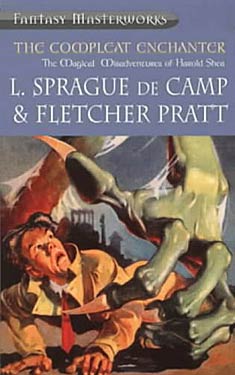L. Sprague de Camp and Terry Fletcher
Completed 7/18/2014, Reviewed 7/23/2014
4 stars
This is a collection of the five comical stories which deal
with magic by sending psychologists into parallel dimensions which are based on
mythologies. It’s about 400 pages of
entertaining fluff, grounded in the details of our epic fantasies. It’s an early forerunner of other genre
parodies like “Hitchhiker’s Guide to the Galaxy”, the “Myth-Adventures”, and
many of Terry Pratchett’s works. While
not quite as satirical as more current parody literature, it’s loads of fun.
Of the five stories, my favorites were:
“The Roaring Trumpet” – based on Norse mythology,
“The Wall of Serpents” - the Finnish mythology of the “Kalevala”
“The Green Magician” - Irish mythology.
The two I didn’t like as much were:
“The Castle of Iron” - Ludovico Ariosto’s “Orlando Furioso”
with a little “Kubla Khan”
“The Mathematics of Magic” - “The Faerie Queen”
The two I didn’t care for as much felt too drawn out. In “The Castle of Iron” and “The Mathematics
of Magic” I thought the authors got bogged down in trying to make the languages
too realistic and at the same time funny.
I often found it hard to follow.
But according to the forward, it had to do with the authors’ making fun
of the belief that fantasy always had to be told in medieval wording, and this
was their response to that criticism.
I liked the other three because I felt like they were having
more fun creating these universes. For
example, a fun part of “Trumpet” is that all the Norse giants speak like New
York thugs. Or perhaps, it was because I
know less about Irish, Norse, and Finnish mythology and thus find them more
interesting than standard medieval English and Arab fantasy.
The basic plot is that Harold Shea, a psychologist at a
research institute, with his colleagues discovers you can travel to parallel
worlds by using mathematical logic equations, the “magic” of our universe. However, once in a different universe, you
can perform the “magic” of that universe, as defined in the mythologies it’s
based on. To return to our universe, you
must use the magic of that universe.
There’s an ongoing sub-plot of what’s happening in the real
world, which involves the constant disappearance of these people, and the
subsequent missing persons investigations by the police. One of the most fun characters is one of the
detectives, who accidently ends up in the third story in complete denial of
what’s going on, but ends up completely buying into it by the fifth story.
Another fun sub-plot is that Harold, and basically all the
other psychologists, are socially inept, but by going to these parallel
universes, they have a chance of meeting their dream girls. In one of the stories, Harold meets Belphebe,
which adds the humor of an American having a relationship with a medieval
maiden archer. With the first story
being published in 1948, you’ll find some archaic, sexist language and roles. But to the authors’ credit, Belphebe is quite
a strong and independent female character.
This collection of stories is quite a fun read. It’s a great concept, a bunch of socially
awkward, analytical psychologists bumbling with magic in our cultural
mythologies. Having always been a fan of
parody, I enjoyed my time with it. And I love when you can tell that authors were
having fun when while they were writing their books. Four out of five stars.

No comments:
Post a Comment